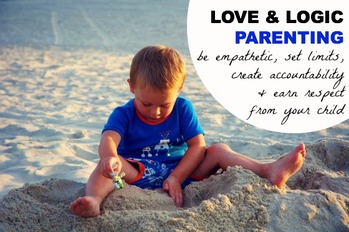|
Click here to register for "Parenting the Love and Logic Way"
Six Wednesdays October 4 - November 8, 2017 7:00 to 9:00 pm Unity Northwest Church 259 E. Central Rd, Des Plaines Near Rand and Central Rds Click here to register!
0 Comments
 My son's third grade teacher was an angel sent from God. None of our neighbors thought so. I didn't think anything of it when kids would find out who he had been assigned to for third grade, their comments would be along the lines of, "Oh, she's mean", and, "Bummer, dude." Well, a mean teacher to a kid means that she keeps them in line and enforces classroom rules. I'm all for that. But when the parents would hear who he had for a teacher, then wince and sadly say, "Ohhhhhh", I admit I was a bit worried. She turned out to be exactly what my son needed the most. She spent long hours with me many a-day after school, trying to figure out what would work best for my son in the classroom. She told me one day, "I lose sleep at night if I think I'm not reaching a child in a way that will help him learn." And, I knew she meant it. We worked together until he was up and running in his new school, and loving it! One of the best pieces of advice she gave her school kids' parents on Curriculum Night was this: "It is so easy to complain about school. We work those kids hard. They will be happy to tell you all the bad things that happened in school each day. What I highly recommend to you parents is to challenge them each night at the dinner table with this question: 'What are three good things that happened at school today?' Have this interaction consistently, and they will begin to look for good things during the day. It makes a big difference when they are looking for the positive, instead of expecting what's hard at school." So, since our dinner time never seemed to lack discussions on the awful things that happened that day, we decided to implement that at our house, not only with our third grader, but our seventh grader as well--and three years later, this remains our dinner table ritual on school nights: We sit down to dinner, say our meal blessing, then ask "Who wants to tell us their three good things first?" It's fun to see them race to go first. When one is speaking, she or he gets everyone's full attention. We can ask questions about the good thing, or simply listen respectfully. We did have to make the rule that having pizza for lunch didn't count as one of the good things, but what game played in gym class is okay. Our kids are always processing their daily lives, just as we do as adults. In Dr. Dan Siegel's book, Mindsight, he describes how learning to process day-to-day occurrences as children supports emotional regulation as adults as well. Encouraging kids to talk about their experiences gives them a safe space to do this. Journaling is a great processing tool, and many of you know that I am big on it. Recently, educator Kevin Strauss sent me information on his website called FamilyeJournal.com. Here is Mr. Strauss' description of this innovative, family bonding site: "FamilyeJournal (FEJ) is like family dinner online. FEJ offers a new set of four questions each day and each family member responds online. When you read your family member's answers, a new rapport, familiarity and connection occurs. It's simple, free and fun to share online which leads to a stronger connection offline." So if your family is busy with activities, and more time is spent on Facebook than face-to-face, you might try FamilyeJournal out to connect your family more deeply, yet simply. No matter the method, giving our children an avenue for discussing their day, both the positive and more difficult aspects of the day, is important to learning emotional processing and regulation, as well as feeling loved, listened to and supported.  When my oldest child was four years old, she had the run of the household. Everyone knew it but me! A friend invited me to a parenting class called "Becoming a Love and Logic Parent". I soon began enjoying parenting much more--and my new parenting choices gave my kids a better start in life! That oldest child is now 17 years old. Recently she said to my husband, "I want to know how you and Mom raised me so that I turned out the way I did, instead of like some of the other kids at school. I want to raise my kids that way, too." That is truly the highest compliment I ever received! I give much of the credit to the principles of Love and Logic as we applied them to our home. I took that class three more times before becoming a facilitator. I still love learning from this class as I am facilitating it! Beginning October 6, 2014, from 6:30 to 8:30 pm, I will be leading "Parenting the Love and Logic Way" for six Monday evenings. The multimedia class will be held in the Fellowship Hall of Unity Northwest Church, 259 E. Central Rd, in Des Plaines, IL, near the intersection of Rand and Central Roads. Cost is simply a free-will offering, received each class, plus a $10 fee for the Love and Logic Parent Handbook. This class will teach you how to:
This parenting program is designed to give you practical skills that can be used immediately! I hope you can join me and other parents who are committed to positive, healthy parenting! Click on the image and register today!  Parenting the Love and Logic Way™ A six session parenting program designed by the Love and Logic Institute. Click here for the registration form. Learn how to:
This parenting program is designed to give you practical skills that can be used immediately! WHEN: Sundays, Feb 2 – March 9, 2014 1:00 – 3:00 p.m. WHERE: Unity Northwest Church 259 E. Central Rd Des Plaines, IL 60016 COST: A free-will offering will be collected at each class.* *Fee for parent manual is $10, payable at first class. Facilitated by Lynn Barrette, LCSW, LUT, phone: 224-828-9877 Behavioral Health Therapist and Independent Facilitator of Love and Logic  With Father's Day arriving in less than a week, here's some good advice for dads (and moms): Ask your children, "Am I the dad/mom you need me to be?" Kids' perceptions of how their parents behave make more of an impact than the actual behavior. Think about how your parents raised you. Even if your mom or dad was kind and loving, if there was a behavior from a parent that you perceived as too much or not enough, wasn't that the thing that bothered you most when you were growing up? How true is this for you? Often in therapy (or in any work we do within ourselves) we deal with the behaviors that went missing or were overbearing from our parents. This especially shows up in our intimate relationships. Checking in with our own history, and making peace with it, helps us be better parents and have the courage to ask the question of our children: "Am I the parent you need me to be? How can I support you better?" Here's a link to the interesting study that explored the impact of dads across cultures: Study Suggests Fathers Should Ask Kids: 'Am I the Dad You Need Me to Be?' Bottom line is that the emotional engagement of dads is important. How securely moms are engaged is important, too--it's just that often this is more natural for moms than dads. Additionally, there is an innate sense of males as authority figures, so when the men in a child's life are healthily interactive and supportive, the child grows up with a more balanced sense of authority, and therefore of him- or herself. Thanks, all you engaged dads, and happy Father's Day in advance! (For a special gift for Dad this year, let him know how important his input is by giving the gift of parenting support! Sign him up here for Love and Logic with Lynn!)  Join Lynn for this class and upgrade your parenting skills! Love and Logic® is a parenting philosophy that provides simple and practical techniques to help you have less stress and drama and more fun and compassion while raising responsible kids. Love and Logic® offers many useful techniques that you as parents, teachers, grandparents and caregivers can begin experimenting with immediately! As you apply love and logic to your own home guidelines, your children will begin to think for themselves with the wisdom and compassion you model for them. Through the course, you will be able to discuss, apply, and problem solve these techniques and learn how to:
Mondays, September 9, 16, 23, 30, October 7, 14 7:00 - 9:00 PM Cost: $70 individuals | $100 parenting partners in the same household—$10 discount for payment 10 days advance Infinity Foundation – Sign up at link below! 1282 Old Skokie Rd, Highland Park, IL 60035 Click here to register!  Hello, Parents! I hope your school year is smoothing out as we move into beautiful autumn weather. If your house is like mine, you are seeing some awesome improvements this year over last: Remembering backpacks, organizing papers, bringing homework supplies home, and so on. It is a breath of fresh air! At the same time, maybe you are seeing those old habits from your child as well: Forgetting completed homework at home, assignments slipping through the cracks here and there, important papers ending up in the recycling can, and such? So what is our first instinct to do as a parent? Lecture! Oh yes, lecture them on the important value of responsibility; remind them of what they need to do, when they need to do it, and why it needs to be done; and give them examples of all the ways they could be more responsible at school and home. And, if lecturing doesn't work, we throw in a threat or two for good measure. Yet, every parenting expert tells us that lecturing about responsibility actually interferes with our children learning how to be responsible! It has the opposite effect! How frustrating is that?! When we remind, nag and lecture our children, we are giving them the disempowering message: "You are not capable of handling this without me." And, since our children love us, they believe us and quietly become dependent on our nagging...which requires us to turn up the nagging and lecturing volume...which we don't like...so we nag and lecture more...which teaches them that they can't function without us...so they are slower to realize their own self-empowerment necessary for becoming independent, functioning adults...then we nag and lecture about that...Yikes! In my practice, I have seen how this negative cycle can cause anxiety and even depression in children and teenagers. If mom or dad is always telling them what to do, why should they learn to make their own decisions and be responsible for the consequences for those choices? Yet, our kids want to be responsible, even if they scream and holler about it in the moment. An accountable child is a happy child! I'll repeat that: An accountable child is a happy child! Say it with me: An accountable child is a happy child! Let's put ourselves in their position for a moment: Pretend that you are starting a new job, something that you are fairly familiar with, but still need some guidance here and there. You soon learn that your boss is a micro-manager. A micro-manager is someone who has their fingers all over what is yours to do. You find this boss always is in your business, over-critiquing every move you make, lecturing you about what you did wrong upon a perfectly acceptable project completion, what you have left to do, when you left a paperclip on your desk at night...you get the idea. How would that make you feel? Pretty resentful, right? Would you be motivated to go the extra mile, knowing that you'll be lectured about it anyway? Probably not. Your job would become an oppressive task you had to do, accomplishing only what your boss tells you do so that he'll finally shut up. Ooo! Do we sound like a teenager now? I think so! So now that we get it, what can we do about it? How can we support our children's self-responsibility, minus the nagging and lecturing? By taking responsibility for our own business. I know it seems like we do that every minute, but perhaps there is an area of parenting where we can take this a step further. Think of an area in your child's daily life where you would like him or her to be more responsible. You can probably think of several, but take one at a time. Do you want your child to pick up their wet towels off the wood floor after showering? Do you want them to be more on top of their homework? Do you want them to be kinder (or at least civil) to their sibling? Next, here is the question to ask yourself: What do I have control over in this situation? Do I have control over my child's arm the moment he drops the wet towel on the floor? Um, no. Do I have control over how long that towel stays there? Yes. Do I have control over my child enough to will him to pick up his wet towel? No. Do I have control over how much he pays me to pick up his wet towel? Ah, yes! What does my child have control over? Choosing in the future to drop the wet towel and pay mom, or hang it up and save a buck. Who's happy about being responsible now? Let's try another example: Do I have control over whether or not my child does his homework? Not really, unless I forcibly sit her down at the table, etc. Do I have control over what the teacher does with her if her homework doesn't get done? No. Do I have control over whether she stays in at recess or gets an F for the assignment? No. Do I have control over what college she gets into? Nope. Then what do I have control over? I have control over what time I am available to help with homework, when the t.v. and computer get to be used, whether or not she has texting services on her cell phone, whether or not I drive her to piano lessons if homework isn't done, what she is allowed to do over the weekend based on her grades in school...You get the idea. What does my child have control over? Whether or not the homework gets done. This is how we take responsibility for ourselves as parents: Owning what we can and are willing to do, and leave the rest up to the child. Okay, last example: Being more respectful to a sibling What do I have control over? Do I have control over what comes out of my child's mouth? Don't I wish! But, sadly, no. Do I have control over any possible consequences for unfortunate behavior? Absolutely! One magical little question--"What do I have control over?"--can make all the difference in the world for a child and for us as parents! Pair this with the mantra: "An accountable child is a happy child," and you have a formula for a more delightful parenting experience! *** Feel free to call or email any questions or comments you might have. For more support on this topic of ending nagging and lecturing, visit this amazing article at Empowering Parents: Irresponsible Children: Why Nagging and Lecturing Don't Work  Greetings, Parents! Well, it is that time of year. Slowly we are creeping into our new routines before and after school. This is a great time to check in with ourselves to see if we are working too hard for our children's success in school. I've already had to bite my tongue, sit on my hands, and walk away to keep myself from helping my children adjust to their new school starting time (7:30 a.m., really?), time management, homework load, organization and extracurricular activities...That pretty much covers it, doesn't it? Here is a great article from Empowering Parents on learning the balance between being a responsible parent and "helping" too much: Learned Helplessness: Are You doing Too Much for Your Child? My favorite highlight of the article is: Stay in your own box: We must learn to distinguish what is our responsibility as a guiding parent, and what is our child's life lesson. How do we do this? 1. Recognize when we are helping too much. Usually, if we are stressed or worried about our child's “something” getting done, we are totally in their box. You know the feeling: tense stomach, clenched teeth, hands all over their backpack and school work. What can you do to get out of his or her box, and back into your own? 2. Expect resistance to our retreat. Whenever we change parenting behavior, we can expect that our children won't like it, especially when we are not "helping" them (read: "doing things for them") as much as we were before. Signs that you are getting resistance from your child: Whining, thrashing about, "I can't do it," "I'm not smart enough," "I'm too tired," maybe even some yelling and stomping. This is when we really have to stick to our parenting guns. 3. Expect resistance to our retreat. No, that isn't a typo. I did repeat #2, except that #2 is about our child's resistance to change. This one is about our own resistance to changing. We don't like to see our children fail. Ever. It is hard to stop ourselves from reminding our children about the importance of sleep, protein for breakfast, their need to manage their time wisely, and on and on. For awhile, we might be biting our nails, walking away, hand over mouth, trying to be calm and detached when asking, "So, you got that assignment done, right...? And it's in your backpack, right...?" Then stopping ourselves from running to the backpack and double checking. 4. Stay in our own box! As we consistently remain in check with our responsibilities versus our children's, they will figure out how to accomplish tasks on their own, and we will figure out how to let them. We can support our kids in managing their time and responsibilities so they can learn those life skills that we had to learn as kids. At the same time, we are lowering our stress level by not adding our child's responsibilities to our own long list of "to-dos." Enjoy the routine of the new school year, and may you have many opportunities to remain free and clear of what is your child’s to do! |
Helpful Parenting Sites:Love and Logic Parenting Archives
February 2017
Categories
All
|

 RSS Feed
RSS Feed